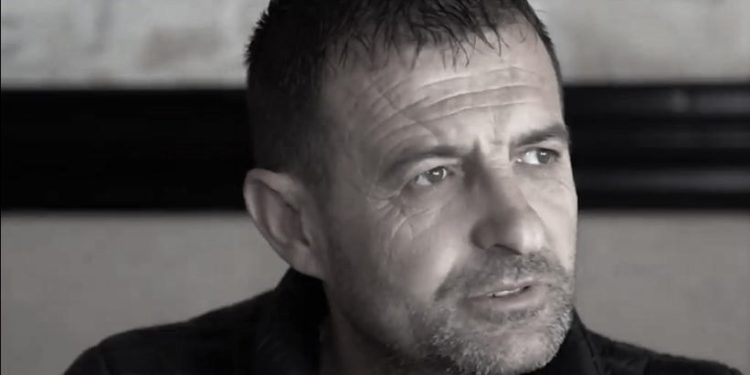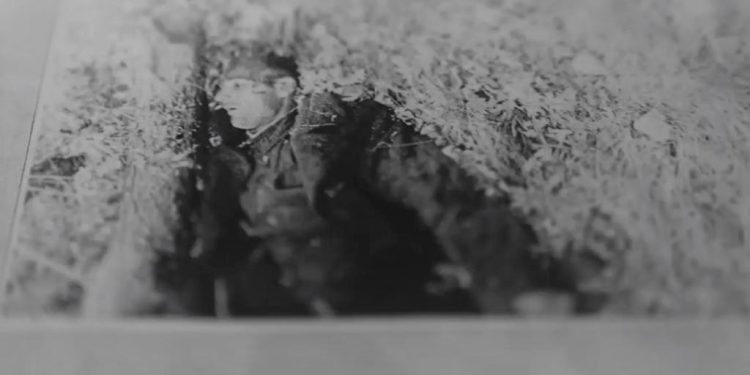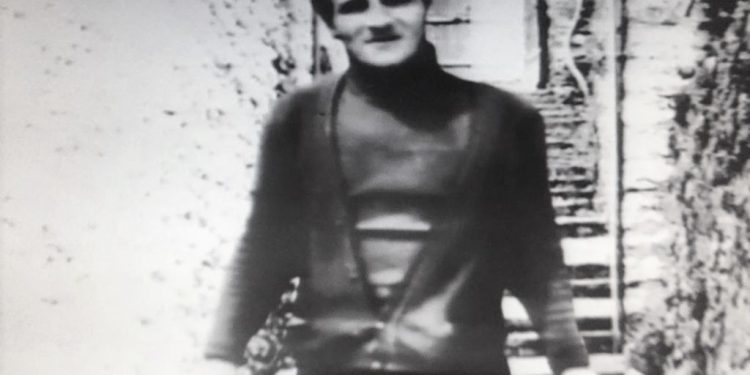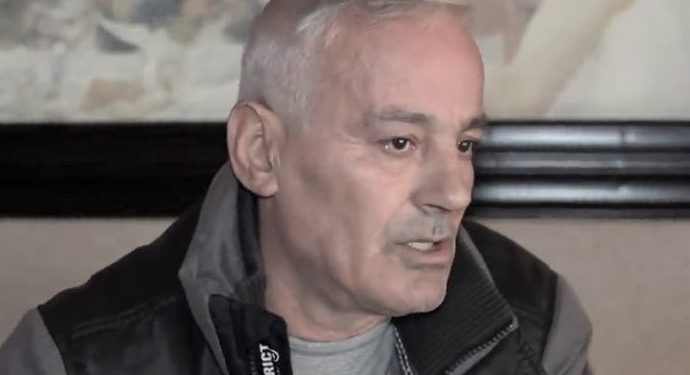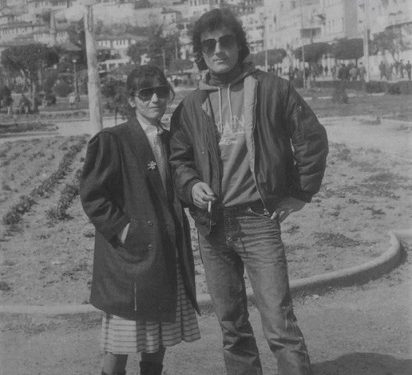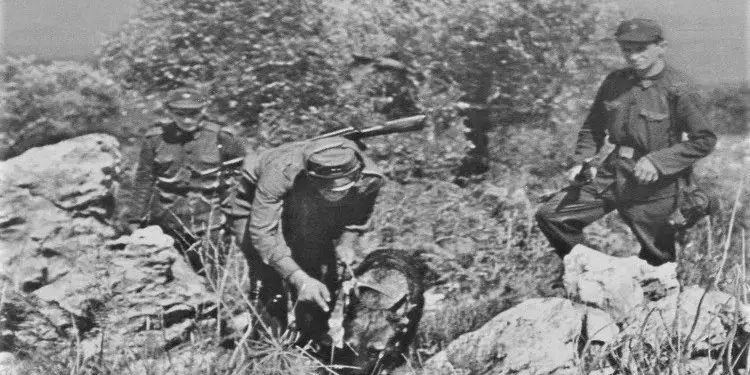Memorie.al publishes the unknown story of the young man from Berat, Pelivan Mjeshova, who in April 1984, together with his two friends from Berat, Luan Berberi and Adnand Kuka, tried to escape to Greece, from the toxic border in the village of Peshkepi in the district of Gjirokastra, but they were ambushed by the border units of that area and Pelivani was killed, while his two friends were wounded, they were arrested and sentenced to 25 years in prison each, on the charge of “treason hard on the homeland”. The inhumane treatment up to the limits of the macabre that was done to the corpse of Pelivan Mjeshova, which was driven around in an open car in the villages of that area, to terrorize the inhabitants of that province, and then exposing it for three days in a row to the Department of Internal Affairs of the city of Gjirokastra, where, under compulsion, almost all the enterprises of that district were sent to see the “enemy of the people”! The rare testimony of Pelivan’s nephew, Eduart Mjeshova, from the city of Berat, who tells the whole story he has learned about his uncle’s execution, the vicissitudes their family had and how they managed to find his remains after 12 years!
After the murder of Pelivan Mjeshova, in an attempt to escape, the only thing the family learned was that he had died after betraying the homeland. The file that was later provided by the nephew, Eduart Mjeshova, shows how Pelivani was killed in an attempt by the border forces, who after shouting the slogan “Stop” shot at the young man until he fell down and then, from the wounds he received, had given soul
What is not stated in the file, but which, according to Eduarti, all of Gjirokastra knows, is that; for three days, Pelivan’s dead body was paraded and exposed to instill terror in the population of the city and its surroundings. It took the Mjeshova family 12 years to find the remains, six until communism collapsed and another six of failed searches as people were too afraid to tell the truth or were not interested in doing so, but finally the remains were returned home and today rest in Berat, his hometown.
The full testimony of Eduart Mjeshova from Berati
I am the grandson of Pelivan Rexhep Mjeshova, the son of Xhevahir, one of Pelivan’s five brothers. My name is Eduart Mjeshova.
In what year did your uncle try to escape?
The event happened on April 3, 1984.
How do you remember that time period and what was Pelivani doing there in Berat?
When the incident happened, I was 10 years old. My uncle Pelivani, even the army that he has done, he stopped in half, because he was convicted once for the reason that when they had a social dinner, he hit a police officer and he was sentenced to 1 year in prison and he did the prison in Borsh. Once he was in another prison, in Lezha prison, in Torovica. From Torovica, he was brought to Borsh because he was sick of his stomach, he was suffering a little, and there he served his sentence. Then, he was sentenced to three years of exile in the villages of Tërpan, Vokopolë. After that, they called him a soldier again. He was at the age of 25.
How did he decide to escape?
Desolate, how he wanted to escape from this country, because he could not stand that communist regime. He was very developed, but he also received information from the televisions, since we kept him in Italy, in Yugoslavia. He looked for a better life, and decided together with two of his friends, Adnand Kuka and Luan Berberi, to escape.
From what point would they escape?
To begin with, it was almost two weeks since they talked with Kujtim Malo, who was his right-hand man. They went to Klement Veshoja in Pogradec, stayed there for two weeks, but could not make it. It was impossible for him to escape from there. Then, he chatted with a Ladi, we have our man, with a nephew of my aunt’s husband.
He had joined the army in Librazhd, but he had told him: “Come here from Librazhd, there is fear that they will return you. It is a very steep area even to turn around”. He didn’t even manage to escape from there, and then he decided to escape at any cost, wherever he could. He met Adnand Kuka, he also chatted with Luan Berberi. He decided to escape in the direction of Gjirokastra, the border point Peshkpi.
What do you know about the continuation of the story?
I know, according to the records, that I had both good and bad luck, (that I remembered my uncle as a king boy), but when the other uncle, Flag, (who is before Van) tells me after the 90s -to: – “Edi, we need a document, because we are persecuted”. I don’t know what help he would get. “Since you work abroad, you also work here from Gjirokastra, see that you need to get us a document”.
I even locked the car, because I was working with a barge. I take a taxi, 10 thousand ALL to Gjirokastra and myself to the Court of Gjirokastra. I went there quickly, in fact, it wasn’t open yet. It was the policeman, the guard of the building. I even chat with him. – “What are you interested in”, he asked me? – I want to get a document, – I said, – here, here. – “Yes,” he told me, “what is it about?” I wasn’t giving him clues. Then, I said: Here, here… – “For the soldier of ’84?” he said. – Yes, we all know it.
What did you learn from the uncle’s murder case?
When I received the file with the archival documents, I found out what happened…! I remembered my uncle, I was ten years old, I remembered the king, but when I saw him in that condition (from the photos in the file) where it was clear that he had a bullet in his head, rather than four bullets in his body, I started a great hatred for ex-communists like, many, many other families, like many, many people like my work have suffered from that regime…!
I forgot to mention something else, that when they left the department with Luli and Adnand, they ran away with their minds asleep, because they knew that the border was 6 hours away, that’s what Adnand told them: “for 6 hours we are in border”, while these were born in the plains of Jorgucat. I am also sorry, since he left my uncle, Vani, when they searched his pockets (after they killed him), they found baking soda and a recipe.
He thought that “I will pass there and take the stomach medicine”, because he was suffering a little from his stomach, and he was drinking soda. He also said to Luani: “Luli, I don’t back down, I know that even if they catch me, they will shoot me.” That he was the oldest, even so he did not back down.
What did the court policeman know about the ’84 event?
He told me that…! “I saw it with my own eyes,” he said. I know the event very well, he said. I have seen that his body, from 8:00 AM to 12:00 PM, was lying in the village of Jorgucat, with a 51 “Gas” gas, with the sides open and the sides oozing blood. His body was taken from Jorgucati to Gjirokastra, on the national road, then, the dead body, was left at the Internal Affairs Branch of Gjirokastra, at the coal, it was a…!
All of Gjirokastra knows this, if you ask Gjirokastra about the 1984 event. It was also organized by the city there; it was organized in work enterprises, such as the Shoe and Tobacco Company of Gjirokastra, which quit their jobs to look at the ‘enemy of the people’. They scared the people even seeing his dead body”. This is what the court policeman I met by chance told me.
How long was this demonstration?
This lasted for three days. It has been three days…!
How did your family find out about Pelivan’s murder?
On April 4, 1984, it came to us…! I was a child. We stayed at the palace in “Çelepias”, at the arch palace. The chairman of the People’s Council of the neighborhood came to us, I don’t know, the chairman of the Council or what he was, Kastriot Bejko. The grandmother knocked on the door and opened it (it was done for the desolate mercy), who passed away five years ago, Pelivan’s mother.
He opened the door. – “Order Kastriot, inside”, she told him. – “No, I won’t go inside,” he said, “but are any of the bags there?” At that time, Luti, Mevlut, the other uncle who is behind my father comes out because the others were at work. – “Order Kastriot, come on.” -“No, no, come outside for a bit:, he told him. They even went to the entrance. There, Kastrioti told him: “Your brother is dead.” -“Why did he die?! That I have a brother who is a soldier.
“Did he get caught in a tunnel?” – because he was working in engineering. – “No, no,” he said. “He betrayed the country.” My aunt, my desolate grandmother, as always scared, heard these talks from behind them….! He took off his headscarf and entered the house, tied it around his belt and for so many years, he washed, rinsed with it, did not take it off, it dried on his body, moistened it, dried it.
About the possibility of taking the body, did they tell you anything at that time?
No. We didn’t know anything at all. We are also scared. The brothers became all together, that we…the grandmother was one, I don’t know, like that mother, like that grandmother is not born again, she was very smart, she was uneducated, but she was very smart. That a boy escaped, you understand, we were also afraid of deportation.
What happened to you, i.e. to your family, did you have any consequences?
The consequences…, the first ones were these: my uncle, the eldest, worked as an agronomist, the Union (thankfully, he passed away 2 years ago), he was fired…! The other uncle, Besnik, was a chef at the Hotel – Tourism and at the tourist point of Berat, one of the best chefs; he was left without a job for three years, after he was fired immediately. The other uncle who was in front of Van, who worked as a driver, had his car taken away.
They didn’t move only my father, who worked in the Automotive Goods Park working with the irons, and the other uncle, (who was before Van), they also took him to the Park, they took him to sweep the territory of the Park, i.e. cleaner, and then later they took him to gomist. Even Mevlut was not moved because he was a simple worker of the water company, a shovel worker, so they had nowhere else to take him.
They didn’t deport you?
We were not interned. I wanted to emphasize this. We had an unmasking meeting like they did back then, it was held in the “Red Corner” and the neighborhood helped us a lot, I know thank you and I want to highlight a name here. It was the chairman of the Democratic Front of the neighborhood, Fatmir Vrapi, who spoke, who spoke well for us. (I was lucky enough to have him as a tutor, in Textiles, Mechanical school). Fatmiri said something: “What do you have with the other bags? These are good, they do not behave badly. Let’s remove the burdens of the Front only from Naxhia”. And so it happened that he could be heard talking.
After the collapse of communism, you started looking for the remains. How did you manage to find them?
At that time, the uncle, who was a driver, bought a car (when these cars were also privatized) and started moving for this job, so he was looking for the remains of his brother and one by one, he went to Gjirokastër, to Kakavija. We tried, we asked, but apparently they were the same people, and they didn’t tell the man anything. Maybe from fear, maybe from…! And we didn’t know anything at all; we didn’t have any information about where Vani could have been buried. This continued for five consecutive years.
When one day, a friend helped us…he was a policeman, but he had been imprisoned in the Qafë-Bari camp…! He was a friend of Dane Çiflig. He got interested and found the scheme and also found the name of the one who had buried my uncle, Pelivani. He worked as a prison guard in Berat, but he had served in the army there and was there as a school for the State Security.
I know that his uncle told him: “Do you know that you buried my brother? We have been looking for it for five years and you didn’t tell us”? – “No, who told you?”, he answered. Apparently, he was scared at first, but then he said: “Yes, I buried him.” That’s what he said and at this time, we went, we took him with us, the first day in Gjirokastra.
We dug the first day, we found nothing. Then, we went on the second and third day, looking for the place, according to the data, “it was a rock”, he said. – “Yes, I remember that I put it in a crooked way because the pit didn’t even take it”, he told us. At this time digging, he told us that he remembered that ten meters, ten steps from the rock and there we saw a place that had made room, which seemed to be a pit. We started the excavations. I also have it filmed. The search began, when the hood buttons came out, his hood came out, his underpants, his shirt, his ring, and his socks. I was present myself…!
What year did this happen, so when did you find the bones?
This happened…when we found the remains; it was in ’96…! Then we took the bones, put them in a bag, in two black bags if I’m not mistaken, then we immediately came to Berat.
What did finding the bones mean to you?
He was a great joy for us because many other families have not found the remains yet and today, he is also laid to rest in… He is laid to rest today in the Berat cemetery, in Burdullias, but I can’t forget just one thing. I have two things from my uncle’s story. He had many grandchildren and has many grandchildren. The first was, when this happened to us (that is, before they went to escape) and he had brought a stove, bought it in Pogradec, because he had a friend in Pogradec, Klementin… Muça they called him.
And his mother says: “Pelivan, look, don’t take any stove from us”. He also brings it. Even the desolate grandmother cried, cleaning that stove because she only enjoyed the stove she had from him, not even her body…! Even the last time, when the remains came home, it turned out…! We arranged it in a small coffin. – “The evil mother,” he said, “I knew that one day it would come to my mother’s house, it came after 12 years.” Even he was kissing…he opened the coffin; he was kissing those bones…!
Do you have a message for the families who are still looking for the remains of their relatives and for the relevant state institutions?
I wish that all those families who have not found the victims of communism and those who suffered, should have more support from the institutions, to ease their pain, that they have not had until now. Even for the persecuted, the Albanian state should pay more attention, because even the most honorable people are suffering people. Memorie.al




